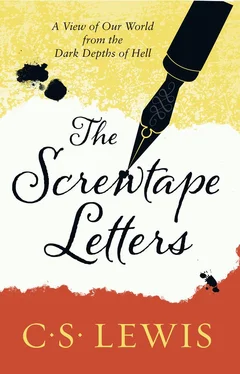The SCREWTAPE LETTERS
with
Screwtape Proposes a Toast
C. S. Lewis
William Collins
An imprint of HarperCollins Publishers
1 London Bridge Street
London SE1 9GF
www.WilliamCollinsBooks.com
First published in Great Britain by Geoffrey Bles 1942
The Screwtape Letters Copyright © C. S. Lewis Pte Ltd 1942
Preface to The Screwtape Letters copyright © C. S. Lewis Pte Ltd 1961
Screwtape Proposes a Toast copyright © C. S. Lewis Pte Ltd 1959
Preface to Screwtape Proposes a Toast copyright © C. S. Lewis Pte. Ltd 1982
From The World’s Last Night by C. S. Lewis
Cover design and illustration by Kimberly Glyder
The right of C. S. Lewis to be identified as the author of this work has been asserted by him in accordance with the Copyright, Designs and Patents Act 1988
A catalogue record for this book is available from the British Library
All rights reserved under International and Pan-American Copyright Conventions. By payment of the required fees, you have been granted the non-exclusive, non-transferable right to access and read the text of this e-book on-screen. No part of this text may be reproduced, transmitted, down-loaded, decompiled, reverse engineered, or stored in or introduced into any information storage and retrieval system, in any form or by any means, whether electronic or mechanical, now known or hereinafter invented, without the express written permission of HarperCollins.
Source ISBN: 9780007461240
Ebook Edition © June 2009 ISBN: 9780007332250
Version: 2015-11-24
To J. R. R. Tolkien
The best way to drive out
the devil, if he will not yield to texts of
Scripture, is to jeer and flout him, for
he cannot bear scorn.
LUTHER
The devil…the prowde spirite …
cannot endure to be mocked.
THOMAS MORE
Contents
Cover
Title Page
Copyright
Dedication
Epigraph
Preface
Chapter 1
Chapter 2
Chapter 3
Chapter 4
Chapter 5
Chapter 6
Chapter 7
Chapter 8
Chapter 9
Chapter 10
Chapter 11
Chapter 12
Chapter 13
Chapter 14
Chapter 15
Chapter 16
Chapter 17
Chapter 18
Chapter 19
Chapter 20
Chapter 21
Chapter 22
Chapter 23
Chapter 24
Chapter 25
Chapter 26
Chapter 27
Chapter 28
Chapter 29
Chapter 30
Chapter 31
E-book Extra
Books by C. S. Lewis
About the Publisher
I have no intention of explaining how the correspondence which I now offer to the public fell into my hands.
There are two equal and opposite errors into which our race can fall about the devils. One is to disbelieve in their existence. The other is to believe, and to feel an excessive and unhealthy interest in them. They themselves are equally pleased by both errors and hail a materialist or a magician with the same delight. The sort of script which is used in this book can be very easily obtained by anyone who has once learned the knack; but ill-disposed or excitable people who might make a bad use of it shall not learn it from me.
Readers are advised to remember that the devil is a liar. Not everything that Screwtape says should be assumed to be true even from his own angle. I have made no attempt to identify any of the human beings mentioned in the letters; but I think it very unlikely that the portraits, say, of Fr Spike or the patient’s mother, are wholly just. There is wishful thinking in Hell as well as on Earth.
In conclusion, I ought to add that no effort has been made to clear up the chronology of the letters. Number 17 appears to have been composed before rationing became serious; but in general the diabolical method of dating seems to bear no relation to terrestrial time and I have not attempted to reproduce it. The history of the European War, except in so far as it happens now and then to impinge upon the spiritual condition of one human being, was obviously of no interest to Screwtape.
C. S. LEWIS
MAGDALEN COLLEGE,
5 JULY 1941
My dear Wormwood,
I note what you say about guiding your patient’s reading and taking care that he sees a good deal of his materialist friend. But are you not being a trifle naïve? It sounds as if you supposed that argument was the way to keep him out of the Enemy’s clutches. That might have been so if he had lived a few centuries earlier. At that time the humans still knew pretty well when a thing was proved and when it was not; and if it was proved they really believed it. They still connected thinking with doing and were prepared to alter their way of life as the result of a chain of reasoning. But what with the weekly press and other such weapons we have largely altered that. Your man has been accustomed, ever since he was a boy, to have a dozen incompatible philosophies dancing about together inside his head. He doesn’t think of doctrines as primarily ‘true’ or ‘false’, but as ‘academic’ or ‘practical’, ‘outworn’ or ‘contemporary’, ‘conventional’ or ‘ruthless’. Jargon, not argument, is your best ally in keeping him from the Church. Don’t waste time trying to make him think that materialism is true! Make him think it is strong, or stark, or courageous—that it is the philosophy of the future. That’s the sort of thing he cares about.
The trouble about argument is that it moves the whole struggle on to the Enemy’s own ground. He can argue too; whereas in really practical propaganda of the kind I am suggesting He has been shown for centuries to be greatly the inferior of Our Father Below. By the very act of arguing, you awake the patient’s reason; and once it is awake, who can foresee the result? Even if a particular train of thought can be twisted so as to end in our favour, you will find that you have been strengthening in your patient the fatal habit of attending to universal issues and withdrawing his attention from the stream of immediate sense experiences. Your business is to fix his attention on the stream. Teach him to call it ‘real life’ and don’t let him ask what he means by ‘real’.
Remember, he is not, like you, a pure spirit. Never having been a human (Oh that abominable advantage of the Enemy’s!) you don’t realise how enslaved they are to the pressure of the ordinary. I once had a patient, a sound atheist, who used to read in the British Museum. One day, as he sat reading, I saw a train of thought in his mind beginning to go the wrong way. The Enemy, of course, was at his elbow in a moment. Before I knew where I was I saw my twenty years’ work beginning to totter. If I had lost my head and begun to attempt a defence by argument I should have been undone. But I was not such a fool. I struck instantly at the part of the man which I had best under my control and suggested that it was just about time he had some lunch. The Enemy presumably made the counter-suggestion (you know how one can never quite overhear what He says to them?) that this was more important than lunch. At least I think that must have been His line for when I said ‘Quite. In fact much too important to tackle at the end of a morning,’ the patient brightened up considerably; and by the time I had added ‘Much better come back after lunch and go into it with a fresh mind,’ he was already half way to the door. Once he was in the street the battle was won. I showed him a newsboy shouting the midday paper, and a No. 73 bus going past, and before he reached the bottom of the steps I had got into him an unalterable conviction that, whatever odd ideas might come into a man’s head when he was shut up alone with his books, a healthy dose of ‘real life’ (by which he meant the bus and the newsboy) was enough to show him that all ‘that sort of thing’ just couldn’t be true. He knew he’d had a narrow escape and in later years was fond of talking about ‘that inarticulate sense for actuality which is our ultimate safeguard against the aberrations of mere logic’. He is now safe in Our Father’s house.
Читать дальше












